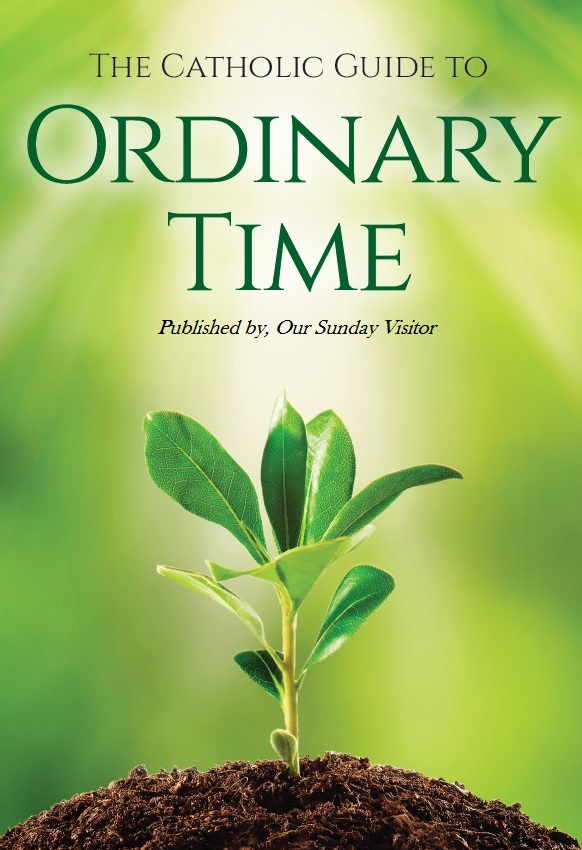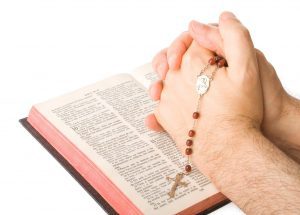
What is "Ordinary Time"?

The season of Ordinary Time begins on Monday (or Tuesday if the feast of the Baptism of the Lord is celebrated on that Monday) after the Sunday following Jan. 6 and continues until the day before Ash Wednesday, inclusive. It begins again on the Monday after Pentecost and ends on the Saturday before the First Sunday of Advent. It consists of 33 or 34 weeks. The last Sunday is celebrated as the solemnity of Christ the King. The over all purpose of the season is to elaborate the themes of salvation history.
The various liturgical seasons are characterized in part by the scriptural readings and Mass prayers assigned to each of them. During Advent, for example, the readings are messianic; during the Easter season, the readings are from the Acts of the Apostles, chronicling the Resurrection and the original proclamation of Christ by the apostles, and from the Gospel of John; during Lent, baptismal and penitential passages are focused on. Mass prayers reflect the meaning and purpose of the various seasons.
Six Ideas for Ordinary Time
Advent has its wreath, its candles, its hymns — all of which culminate in Christmas. Lent has ashes, fasting, Stations of the Cross — followed by the Resurrection. It’s easy to be energized and excited about the Faith during the high holy days. But Ordinary Time? It’s just so, well, ordinary.
How do you stay involved and engaged when Sundays seem to run together and the next liturgical high point is weeks or months away?
Attending daily Mass, saying the Rosary, and going to confession more frequently are all very good practices to incorporate during Ordinary Time. But for something a little different, try one or more of these six ideas, which are both a little different and deeply rooted in our traditions.
1. Create Your Own Novena
A novena, nine days of private or public prayer intended to obtain a special grace, favor, or blessing has long been a part of the Church’s devotions.
You can find novenas for everything from world peace to healing, most of which are directed to end on a particular feast day of Mary, Jesus, or a prominent saint. But you can create your own novena, choosing your own ending day and devotional activity. For instance, create a birthday novena. Do something special for the nine days before your birthday or the birthday of someone you love; you can certainly say a prayer like the Hail Mary or Our Father, but you might also light a candle, read a poem, work on a piece of art, or plant a flower.
Whatever you do, place yourself in the presence of God and offer your activity with your whole heart, mind, and soul.
2. Keep A Gratitude Journal
Some scientific studies have shown that people who regularly “count their blessings” are happier than those who don’t. Often we are so focused on the negatives in our lives we overlook the positives. So, during Ordinary Time, take a small notebook and, once a day, write at least five things you are thankful for. They don’t have to be earth-shattering — a cup of coffee will suffice. Then, on Sunday, read aloud your list, saying before each item: “God, I thank you for …” It seems like a simple activity, but it can literally be life-changing as a concrete, permanent record of the blessings of your life that is hard to overlook even when you are feeling down.
3. Focus on God's Abundance
One year a woman decided that since so many things seemed to be going wrong in her life, she would concentrate on the ways God showed his providence in a tangible, practical manner.
Every day she e-mailed a friend to relate what “abundance” God had provided. Sometimes it was a small thing — finding a quarter on the sidewalk. Other times it was larger — being given a washing machine when hers broke, for example. And sometimes it was non-material, such as having a neighbor offering cleanup by blowing the leaves from her yard. But as the days went by, it became obvious that God was continually showering abundance on her. It became a daily joy to see what new gift God had for her that day.
What gifts will you discover?
4. Act Out Your Faith
One of the reasons our faith can become stale is because it can become too cerebral. Instead of “doing,” we spend most of our time “thinking.” So put your faith in action. No, that doesn’t mean you have to start vigils at abortion centers or volunteer at soup kitchens — although those things are good and may be just what some people need. You can act out your faith in smaller ways as well.
For instance, Jesus told us that if we have two coats, we should share with those who have none. Most of us probably have at least two coats in our closets, so paring down our clothes could be a great place to begin.
During Ordinary Time, simplifying, eliminating, and giving away those things that we no longer use can become a great act of faith … and a great faith-builder.
5. Spiritual Reading
Have you ever read “Confessions” by St. Augustine, “Introduction to the Devout Life” by St. Francis de Sales, or “The Brothers Karamazov,” by Fyodor Dostoevsky? Or, for more modern tastes, “Mr. Blue” by Myles Connolly, “In This House of Brede” by Rumer Godden, or “The Shack” by William P. Young?
In the weeks when the Church is not preparing for something special, we have the time to read what others have written about God, faith, and the meaning of life. We don’t have to agree with everything we read, but reading morally engaging literature is one of the best ways to keep our faith vital and vibrant.
6. Keep The Sabbath
The weeks of Ordinary Time are ideally suited to creating family rituals that keep the Sabbath as a special day. Without the pressure of holidays and holy days, we can design our own personal practices that make Sunday a day to anticipate. As with most things, these don’t have to be elaborate. Perhaps stopping at the doughnut shop on the way home from Mass and letting everyone pick their favorite could become a “tradition.” Reinstitute a sit-down family dinner on Sunday evenings, even if you are sitting down to eat takeout. Read aloud or listen to a book on tape. Just find something you and your family can enjoy and save that activity for the Sabbath.

Ordinary Time Through The Week
Early Church history and tradition teaches that each day of the week has a theme which can help us to celebrate Ordinary Time. Here are some fun and simple activities you could choose to celebrate!
Sunday — The Weekly Easter
Monday — Honor the Holy Angels
Tuesday — Honor the Apostles
Wednesday — Honor St. Joseph
Thursday — Reverence for the Holy Eucharist
Friday — Meditate on Christ’s Passion and Death
Saturday — Honor the Blessed Mother
Ordinary Time Trivia
It Wasn’t Always Ordinary
During much of the Church’s history, Ordinary Time was referred to as the “Season after Epiphany” and the “Season after Pentecost.” It wasn’t until the new Catholic calendar took effect in 1969 after the Second Vatican Council that the term “Ordinary Time” came into common use in the liturgical calendar.
The Cardinal Difference
It’s tempting to think that Ordinary Time got its name because it is, well, ordinary, or non-exceptional, but that’s not really the case. Ordinary Time means ordered, or numbered, time and is derived from ordinal numbers (first, second, third, etc.) as opposed to cardinal numbers (one, two, three).
No First Sunday of Ordinary Time?
If you go to Mass on the feast of the Baptism of the Lord, which is celebrated on the Sunday after Epiphany, you may be startled to see the next Sunday is the Second Sunday of Ordinary Time. What happened to the First Sunday? It’s a little confusing. The Sunday Masses for the Baptism of the Lord are the very last celebrations of the Christmas season. However, Evening Prayer that night is the first liturgical marker for Ordinary Time. Therefore, the first part of that Sunday is Christmas and the second part is Ordinary Time. The next day, Monday, is the First Monday of Ordinary Time. Therefore, the next Sunday has to be the Second Sunday in Ordinary Time, because it is the Sunday of the second week in Ordinary Time.
There’s Always Something to Celebrate
Even though Ordinary Time doesn’t build to a single great feast like Advent or Lent, it is not without its high points. The Assumption of Mary (Aug. 15), All Saints (Nov. 1), and Christ the King (Nov. 22) are just a few of the important celebrations that fall during these weeks.


